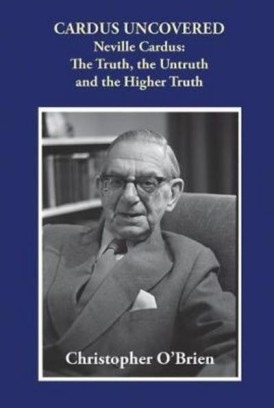Cardus Uncovered
Martin Chandler |Published: 2018
Pages: 311
Author: O'Brien, Christopher
Publisher: Whitethorne Range Publishing
Rating: 3.5 stars

In this reviewer’s experience books that do not look promising rarely rise above the mundane and Cardus Uncovered was not, I have to say, something that immediately struck me as being a book I would particularly enjoy. Cardus has always had his detractors and their various criticisms have become hoary old chestnuts. The existence of factual errors throughout his oeuvre has always been acknowledged, and he himself admitted on occasions to, effectively, not allowing the truth to get in the way of a good story. To my mind you either enjoy Cardus’s body of work for what it is, or choose not to read it at all.
Being someone who has much enjoyed Cardus’s writing since I first read his article on Lancashire cricket in the 1951 Wisden (around twenty years after it was published I hasten to add) I wasn’t therefore looking forward to something I presumed would be an attempt to tarnish his reputation. In that assumption I was wrong, and in fact I much enjoyed the fruits of Christopher O’Brien’s research and have no hesitation in recommending Cardus Uncovered to all of Sir Neville’s aficianados.
The book is not a biography as such, something that has already been done once by Christopher Brookes. That account of his life, two volumes of autobiography and another not far removed from that genre, mean that there has never been a shortage of material available on Cardus. His was an interesting heritage, the son of a prostitute he always maintained he never knew his father. Away from his twin loves of cricket and music Cardus’s own private life was also unconventional, although in his own writings he never sought to shy away from any of that although, as O’Brien discovers, a good deal of what he wrote was less than accurate.
It would be interesting to know how many hours O’Brien spent reading and re-reading Cardus’s own writings, and those of Brookes and Robin Daniels (who wrote a heavyweight tome in 2009, Cardus, Celebrant of Beauty) not to mention the myriad of other writings by or about Cardus that never found their way into book form. It must have been a goodly number, his purpose in doing so being to analyse the inconsistencies in information given, and to identify those areas where facts were missing, skirted over or said to be unknown.
Having done that preparation O’Brien then set about establishing what really happened. Thanks to Cricketarchive that would have been easy enough with the cricket matches Cardus described (a resource we should not forget that Cardus never had access to) but despite the extensive genealogy materials and newspaper archives that are now available to everyone those are not, to this reviewer’s certain knowledge, quite so easy to navigate.
The result is as full and reliable a picture as we are ever going to get of the Cardus upbringing and family tree and the lives and times of those who feature in it. Much of this was never disclosed by Cardus, in all probability because it was detail unknown to him, or alternatively simply not passed on to him accurately by his seniors.
As a result of reading Cardus Uncovered I also better understand many other aspects of Cardus’s life; the strange marriage, long time mistress and the many trips to Australia (amongst other journeys he was there continuously from 1940 to 1947). Nothing has changed my opinion of Cardus or his writing, but then O’Brien never set out to do that. All he wanted to do, and he does it very well, is shed some light and clarity on the many areas of Cardus’s life where there has always been uncertainty.
I made reference earlier in this review to the Cardus article in the 1951 Wisden. It was the first piece of cricket literature, as opposed to statistics or match reports, that I ever read. I was utterly enchanted by the account of childhood trips to Old Trafford in Victorian times, and I have never forgotten a word of the stories of Lancashire’s Johnny Briggs and Arthur Mold. I know now that a good deal of the detail in that essay wasn’t strictly accurate, but that knowledge did not in any way detract from the pleasure I got the other day from reading the article again for the umpteenth time, albeit probably the first time this decade. Neville Cardus invented cricket writing as we know it, and there has not been a writer since who has not been influenced by him to some degree. To find out so much more about him half a century after his death is as welcome as it is unexpected.






Leave a comment